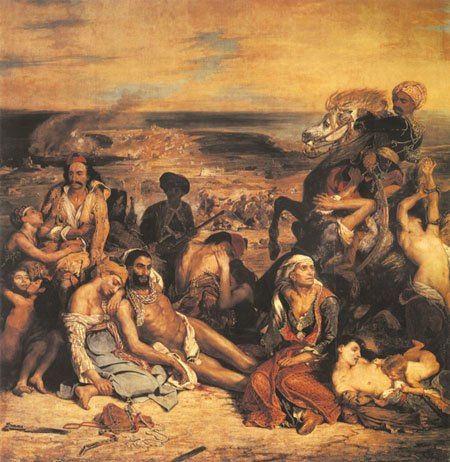The Isles of Greece
The isles of Greece! the isles of Greece!
Where burning Sappho loved and sung,
Where grew the arts of war and peace,---
Where Delos rose and Phoebus sprung!
But all, except their sun, is set.
The hero's harp, the lover's lute,
Have found the fame your shores refuse;
Their place of birth alone is mute
To sounds which echo further west
Than your sires' "Islands of the Blest.
And Marathon looks on the sea;
And musing there an hour alone,
I dream'd that Greece might yet be free
For, standing on the Persians' grave,
I could not deem myself a slave.
Which looks on sea-born Salamis;
And ships, by thousands, lay below,
And men in nations;---all were his!
He counted them at break of day---
And when the sun set, where were they?
My country? On thy voiceless shore
The heroic lay is tuneless now---
The heroic bosom beats no more!
And must thy lyre, so long divine,
Degenerate into hands like mine?
Though link'd among a fetter'd race,
To feel at least a patriot's shame,
Even as I sing, suffuse my face;
For what is left the poet here?
For Greeks a blush---for Greece a tear.
Must we but blush?---Our fathers bled.
Earth! render back from out thy breast
A remnant of our Spartan dead!
Of the three hundred grant but three,
To make a new Thermopylae.
Ah! no; the voices of the dead
Sound like a distant torrent's fall,
And answer, "Let one living head,
But one arise,---we come, we come!"
'Tis but the living who are dumb.
Leave battles to the Turkish hordes,
And shed the blood of Scio's vine!
Hark! rising to the ignoble call---
How answers each bold bacchanal!
Where is the Pyrrhic phalanx gone?
Of two such lessons, why forget
The nobler and the manlier one?
You have the letters Cadmus gave---
Think ye he meant them for a slave?
We will not think of themes like these!
It made Anacreon's song divine;
He served---but served Polycrates---
A tyrant; but our masters then
Were still, at least, our countrymen.
Was freedom's best and bravest friend;
That tyrant was Miltiades!
Oh! that the present hour would lend
Another despot of the kind!
Such chains as his were sure to bind.
On Suli's rock, and Parga's shore,
Exists the remnant of a line
Such as the Doric mothers bore;
And there, perhaps, some seed is sown,
The Heracleidan blood might own.
They have a king who buys and sells:
In native swords and native ranks,
The only hope of courage dwells:
But Turkish force and Latin fraud
Would break your shield, however broad.
Our virgins dance beneath the shade---
I see their glorious black eyes shine;
But, gazing on each glowing maid,
My own the burning tear-drop laves,
To think such breasts must suckle slaves.
Where nothing, save the waves and I,
May hear our mutual murmurs sweep:
There, swan-like, let me sing and die;
A land of slaves shall ne'er be mine---
Dash down yon cup of Samian wine!














